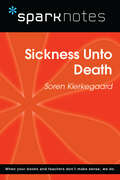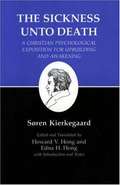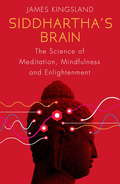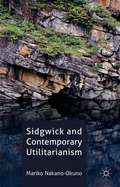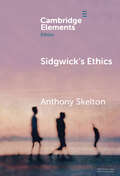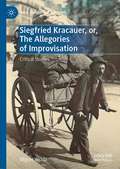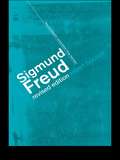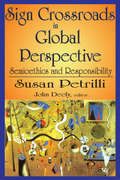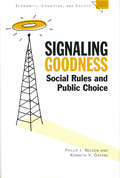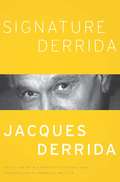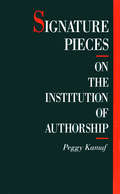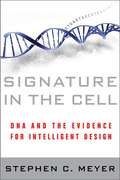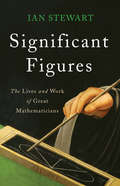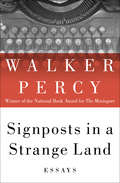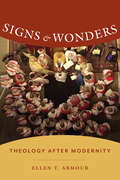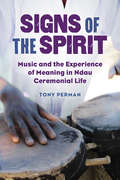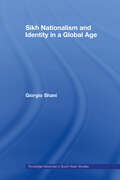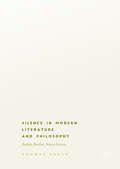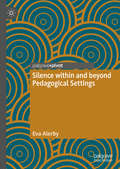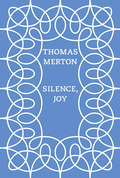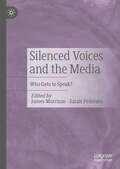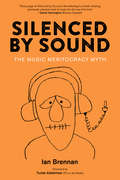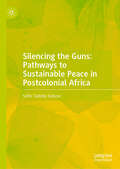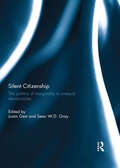- Table View
- List View
Sickness Unto Death (SparkNotes Philosophy Guide)
by SparkNotesSickness Unto Death (SparkNotes Philosophy Guide) Making the reading experience fun! SparkNotes Philosophy Guides are one-stop guides to the great works of philosophy–masterpieces that stand at the foundations of Western thought. Inside each Philosophy Guide you&’ll find insightful overviews of great philosophical works of the Western world.
Sickness Unto Death: A Christian Psychological Exposition for Upbuilding and Awakening
by Howard V. Hong Edna H. Hong Søren KierkegaardThe Sickness unto Death presupposes anxiety but excludes it from consideration, inasmuch as despair is a more advanced stage: "in all despair there is an interplay of finitude and infinitude, of the divine and the human, of freedom and necessity." Anxiety is touched upon very briefly in The Sickness unto Death by way of the analogy of dizziness, but the exclusion of a consideration of anxiety in the advance to an analysis of despair is emphasized by the removal of allusions to anxiety and its related concept of hereditary sin. The relation between anxiety, despair, and sin is signaled, however, in "the dialectic of sin," because "sin presupposes itself" through anxiety.
Siddhartha's Brain: The Science of Meditation, Mindfulness and Enlightenment
by James KingslandWINNER OF THE GOLD PRIZE FOR RELIGION / SPIRITUALITY OF EASTERN THOUGHT AT THE 2016 NAUTILUS BOOK AWARDS.Can meditation and mindfulness exercise make us sharper, smarter, healthier, happier? In Siddhartha's Brain, James Kingsland reveals that a complete scientific theory of how these practices work is now within our grasp and may be the key to treating a wide range of afflictions of the human mind. Some twenty-five centuries ago, an Indian sage called Siddhartha Gautama - the man who would become known as the Buddha - developed a programme for improving mental well-being which has been passed down to us by generations of monks and nuns. Today, secular mindfulness courses are proving their worth for tackling many of the problems associated with the demands of our frenetic, technology-driven modern world.Research has shown that mindfulness can be used to treat stress, anxiety, depression, chronic pain, hypertension and drug addiction, as well as improving concentration, empathy, emotion regulation and the quality of interpersonal relationships. There have even been hints that it could enhance immune function, slow cellular ageing and help keep dementia at bay. Taking us on a journey back to the time of the Buddha to track changes in his brain as he travels the path leading to enlightenment, Siddhartha's Brain explains how meditation and mindfulness transform the human mind.
Sidgwick and Contemporary Utilitarianism
by Mariko Nakano-OkunoThis is one of the rare academic studies on what John Rawls, Peter Singer and Derek Parfit acknowledge as the finest book in ethics The Methods of Ethics written by Henry Sidgwick. With a rather shocking conclusion that 'none of us can match Sidgwick', Mariko Nakano-Okuno elaborately and lucidly analyzes Henry Sidgwick's impacts on contemporary ethics, including critical reassessment of the utilitarian philosophy of R. M. Hare, J. C. Harsanyi and R. B. Brandt. Sidgwick and Contemporary Utilitarianism will be a must-read book for all professional philosophers as well as students concerned with Sidgwick's moral philosophy, utilitarian ethics, and the theoretical foundations of ethics in general. Its language is plain and reader-friendly, which enables philosophy beginners to understand the fundamental questions of ethics more easily and clearly than ever. "
Sidgwick's Ethics (Elements in Ethics)
by Anthony SkeltonHenry Sidgwick's The Methods of Ethics is one of the most important and influential works in the history of moral philosophy. The Methods of Ethics clarifies and tackles some of the most enduring and difficult problems of morality. It offers readers a high-calibre example of analytical moral philosophy. This Element interprets and critically evaluates select positions and arguments in Sidgwick's The Methods of Ethics. It focuses specifically on Sidgwick's moral epistemology, his argument against common-sense morality, his argument for utilitarianism, his argument for rational egoism, and his argument for what he calls 'the dualism of practical reason', the thesis that utilitarianism and rational egoism are coordinate but conflicting requirements of rationality. Sidgwick's Ethics attempts to acquaint readers with the scholarly and theoretical debates relating to Sidgwick's theses, while providing readers with a greater appreciation of the depth and sophistication of Sidgwick's masterpiece.
Siegfried Kracauer, or, The Allegories of Improvisation: Critical Studies (Marx, Engels, and Marxisms)
by Miguel VeddaThis book analyses multiple facets of Kracauer’s work, comprehending the essayistic, narrative, philosophical, theoretical and critical writings, and putting special emphasis on some aspects: the phenomenology of metropolis, the theory of historiographic method, the reflections on the crisis of the subject and the emergence of a new subjectivity, the new forms of perception and aesthetic behaviour in late capitalism, the function of critic-intellectuals, the sociology of the middle classes, the theory of fascism, the aesthetical and sociological reflections on literary genres, the politicization of melancholy. An original feature of this book is the attention it pays to the links between Kracauer’s theoretical and critical writings and the traditions of heterodox Marxism, against a habitual tendency to obliterate the political (and emancipatory) dimension in the German author.
Sigmund Freud
by Robert BocockFirst Published in 2002. Routledge is an imprint of Taylor & Francis, an informa company.
Sign Crossroads in Global Perspective: Semiotics and Responsibilities
by Susan PetrilliLanguage is the species-specific human version of the animal system of communication. In contrast to non-human animals, language enables humans to invent a plurality of possible worlds; reflect upon signs; be responsible for our actions; gain conscious awareness of our inevitable mutual involvement in the network of life on this planet; and be responsibly involved in the destiny of the planet. The author looks at semiotics, the study of signs, symbols, and communication as developing sequentially rather than successively, more synchronically than diachronically. She discusses the contemporary phenomenon that people in today's society have witnessed and participated in, as part of the development of semiotics. Although there is a long history preceding semiotics, in a sense the field is, as a phenomenon, more "of our time" than of any time past. Its leading figures, whom Petrilli examines, belong to the twentieth and twenty-first century. Semiotics is associated with a capacity for listening. This capacity is also the condition for reconnecting to and recovering the ancient vocation of semiotics as that branch of medical science relating to the interpretation of signs or symptoms. The pragmatic aspect of global semiotics studies the impact of language or signs on those who use them, and looks for consequences in actual practice. In this respect, Petrilli theorizes that the task for semiotics in the era of globalization is nothing less than to take responsibility for life in its totality.
Signaling Goodness
by Phillip J. Nelson Kenneth V. GreenePolitical, intellectual, and academic discourse in the United States has been awash in political correctness, which has itself been berated and defended -- yet little understood. As a corrective, Nelson and Greene look at a more general process: adopting political positions to enhance one's reputation for trustworthiness both to others and to oneself. Phillip Nelson and Kenneth Greene are Professors of Economics in the Department of Economics at the State University of New York, Binghamton.
Signature Derrida
by Jacques DerridaThroughout his long career, Jacques Derrida had a close, collaborative relationship with Critical Inquiry and its editors. He saved some of his most important essays for the journal, and he relished the ensuing arguments and polemics that stemmed from the responses to his writing that Critical Inquiry encouraged. Collecting the best of Derrida’s work that was published in the journal between 1980 and 2002, Signature Derrida provides a remarkable introduction to the philosopher and the evolution of his thought. These essays define three significant “periods” in Derrida’s writing: his early, seemingly revolutionary phase; a middle stage, often autobiographical, that included spirited defense of his work; and his late period, when his persona as a public intellectual was prominent, and he wrote on topics such as animals and religion. The first period is represented by essays like “The Law of Genre,” in which Derrida produces a kind of phenomenological narratology. Another essay, “The Linguistic Circle of Geneva,” embodies the second, presenting deconstructionism at its best: Derrida shows that what was imagined to be an epistemological break in the study of linguistics was actually a repetition of earlier concepts. The final period of Derrida’s writing includes the essays “Of Spirit” and “The Animal That Therefore I Am (More to Follow),” and three eulogies to the intellectual legacies of Michel Foucault, Louis Marin, and Emmanuel Lévinas, in which Derrida uses the ideas of each thinker to push forward the implications of their theories. With an introduction by Francoise Meltzer that provides an overview of the oeuvre of this singular philosopher, Signature Derrida is the most wide-ranging, and thus most representative, anthology of Derrida’s work to date.
Signature Pieces: On the Institution of Authorship
by Peggy KamufSome contemporary approaches to literature still accept the separation of historical, biographical, external concerns from formal, internal ones. On the borderline that lends this division between inside and outside its apparent coherence is signature. In Peggy Kamuf’s view, studying signature will help us to rediscover some of the stakes of literary writing beyond the historicist/formalist opposition. Drawing on Derrida’s extensive work on signatures and proper names, Kamuf investigates authorial signature in key writers from Rousseau to Woolf, as well as the implications of signature for the institutions of authorship and criticism.
Signature in the Cell
by Stephen C. MeyerOne hundred fifty years ago, Charles Darwin revolutionized biology, but did he refute intelligent design (ID)? In Signature in the Cell, Stephen Meyer argues that he did not. Much confusion surrounds the theory of intelligent design. Frequently misrepresented by the media, politicians, and local school boards, intelligent design can be defended on purely scientific grounds in accordance with the same rigorous methods that apply to every proposed origin-of-life theory. Signature in the Cell is the first book to make a comprehensive case for intelligent design based upon DNA. Meyer embarks on an odyssey of discovery as he investigates current evolutionary theories and the evidence that ultimately led him to affirm intelligent design. Clearly defining what ID is and is not, Meyer shows that the argument for intelligent design is not based on ignorance or "giving up on science," but instead upon our growing scientific knowledge of the information stored in the cell. A leading proponent of intelligent design in the scientific community, Meyer presents a compelling case that will generate heated debate, command attention, and find new adherents from leading scientists around the world.
Significant Figures: The Lives And Work Of Great Mathematicians
by Ian StewartA celebrated mathematician traces the history of math through the lives and work of twenty-five pioneering mathematiciansIn Significant Figures, acclaimed mathematician Ian Stewart introduces the visionaries of mathematics throughout history. Delving into the lives of twenty-five great mathematicians, Stewart examines the roles they played in creating, inventing, and discovering the mathematics we use today. Through these short biographies, we get acquainted with the history of mathematics from Archimedes to Benoit Mandelbrot, and learn about those too often left out of the cannon, such as Muhammad ibn Musa al-Khwarizmi (c. 780-850), the creator of algebra, and Augusta Ada King (1815-1852), Countess of Lovelace, the world's first computer programmer.Tracing the evolution of mathematics over the course of two millennia, Significant Figures will educate and delight aspiring mathematicians and experts alike.
Signposts in a Strange Land: Essays
by Walker PercyWritings on the South, Catholicism, and more from the National Book Award winner: &“His nonfiction is always entertaining and enlightening&” (Library Journal). Published just after Walker Percy&’s death, Signposts in a Strange Land takes readers through the philosophical, religious, and literary ideas of one of the South&’s most profound and unique thinkers. Each essay is laced with wit and insight into the human condition. From race relations and the mysteries of existence, to Catholicism and the joys of drinking bourbon, this collection offers a window into the underpinnings of Percy&’s celebrated novels and brings to light the stirring thoughts and voice of a giant of twentieth century literature.
Signs and Wonders: Theology After Modernity (Gender, Theory, and Religion)
by Ellen ArmourWe are told modernity's end will destabilize familiar ways of knowing, doing, and being, but are these changes we should dread—or celebrate? Four significant events (and the iconic images that represent them) catalyze this question: the consecration of openly gay Episcopalian bishop Gene Robinson, the mistreatment of prisoners at Abu Ghraib prison, the politicization of the death of Terri Schiavo, and the disastrous response to Hurricane Katrina. Framed by an original appropriation of Michel Foucault, and drawing on resources in visual culture theory and the history of photography, Ellen T. Armour explores the anxieties, passions, and power dynamics bound up in the photographic representation and public reception of these events. Together, these phenomena expose modernity's benevolent and malevolent disruptions and reveal the systemic fractures and fissures that herald its end, for better and for worse. In response to these signs and wonders, Armour lays the groundwork for a theology and philosophy of life better suited to our (post)modern moment: one that owns up to the vulnerabilities that modernity sought to disavow and better enables us to navigate the ethical issues we now confront.
Signs of the Spirit: Music and the Experience of Meaning in Ndau Ceremonial Life
by Tony PermanIn 2005, Tony Perman attended a ceremony alongside the living and the dead. His visit to a Zimbabwe farm brought him into contact with the madhlozi, outsider spirits that Ndau people rely upon for guidance, protection, and their collective prosperity. Perman's encounters with the spirits, the mediums who bring them back, and the accompanying rituals form the heart of his ethnographic account of how the Ndau experience ceremonial musicking. As Perman witnessed other ceremonies, he discovered that music and dancing shape the emotional lives of Ndau individuals by inviting them to experience life's milestones or cope with its misfortunes as a group. Signs of the Spirit explores the historical, spiritual, and social roots of ceremonial action and details how that action influences the Ndau's collective approach to their future. The result is a vivid ethnomusicological journey that delves into the immediacy of musical experience and the forces that transform ceremonial performance into emotions and community.
Sikh Nationalism and Identity in a Global Age (Routledge Advances in South Asian Studies #Vol. 9)
by Giorgio ShaniSikh Nationalism and Identity in a Global Age examines the construction of a Sikh national identity in post-colonial India and the diaspora and explores the reasons for the failure of the movement for an independent Sikh state: Khalistan. Based on a decade of research, it is argued that the failure of the movement to bring about a sovereign, Sikh state should not be interpreted as resulting from the weakness of the ‘communal’ ties which bind members of the Sikh ‘nation’ together, but points to the transformation of national identity under conditions of globalization. Globalization is perceived to have severed the link between nation and state and, through the proliferation and development of Information and Communications Technologies (ICTs), has facilitated the articulation of a transnational ‘diasporic’ Sikh identity. It is argued that this ‘diasporic’ identity potentially challenges the conventional narratives of international relations and makes the imagination of a post-Westphalian community possible. Theoretically innovative and interdisciplinary in approach, it will be primarily of interest to students of South Asian studies, political science and international relations, as well as to many others trying to come to terms with the continued importance of religious and cultural identities in times of rapid political, economic, social and cultural change.
Silence in Modern Literature and Philosophy: Beckett, Barthes, Nancy, Stevens
by Thomas GouldThis book discusses the elusive centrality of silence in modern literature and philosophy, focusing on the writing and theory of Jean-Luc Nancy and Roland Barthes, the prose of Samuel Beckett, and the poetry of Wallace Stevens. It suggests that silence is best understood according to two categories: apophasis and reticence. Apophasis is associated with theology, and relates to a silence of ineffability and transcendence; reticence is associated with phenomenology, and relates to a silence of listenership and speechlessness. In a series of diverse though interrelated readings, the study examines figures of broken silence and silent voice in the prose of Samuel Beckett, the notion of shared silence in Jean-Luc Nancy and Roland Barthes, and ways in which the poetry of Wallace Stevens mounts lyrical negotiations with forms of unsayability and speechlessness.
Silence within and beyond Pedagogical Settings
by Eva AlerbyThis book explores the significance of silence within and beyond pedagogical contexts. Silence is a complex and multidimensional phenomenon for everyday life: since schools mirror society, it is also significant in education. While silence can be experienced in a multitude of different ways, the author reflects on whether silence itself can bear a message: is there an aspect of dialogue in silence, or is it a language all of its own? This book examines a variety of silences essential for education, examining such topics as silence and aspects of power, silent students, and the relationship between listening and silence. Drawing on a range of empirical data, the author elucidates the significance of silence in pedagogical contexts.
Silence, Joy
by Thomas Merton Christopher WaitAn inspiring gift-edition of poetry and prose from the world's favorite monk-poet In this day of mindless distraction, we’re desperate for reasons to put down our phones and reconnect with our spiritual selves. In time for the 50th anniversary of Thomas Merton's death in 1968, Silence, Joy is an invitation to slow down, take a breath, make a space for silence, and open up to joy. <P><P> Poet, monk, spiritual advisor, and social critic, Thomas Merton is a unique—and uniquely beloved—figure of the twentieth century, and this little rosary brings together his best-loved poems and prose. Drawn from classics like New Seeds Of Contemplation and The Way Of Chuang Tzu as well as less famous books, the writings in Silence, Joy offer the reader deep, calming stillness, flights of ecstatic praise, steadying words of wisdom, and openhearted laughter. Manna for Merton lovers and a warm embrace for novices, this slim collection is a delightful gift.
Silence: In the Age of Noise
by Erling Kagge Becky L. CrookWhat is silence?Where can it be found?Why is it now more important than ever?In 1993, Norwegian explorer Erling Kagge spent fifty days walking solo across Antarctica, becoming the first person to reach the South Pole alone, accompanied only by a radio whose batteries he had removed before setting out. In this book. an astonishing and transformative meditation, Kagge explores the silence around us, the silence within us, and the silence we must create. By recounting his own experiences and discussing the observations of poets, artists, and explorers, Kagge shows us why silence is essential to sanity and happiness—and how it can open doors to wonder and gratitude.(With full-color photographs throughout.)
Silenced Voices and the Media: Who Gets to Speak?
by James Morrison Sarah PedersenThis edited collection delves into the multifaceted theme of 'Silenced Voices,' showcasing a diverse array of perspectives from scholars around the globe. From historical reflections to contemporary analyses, the book examines the complex dynamics of voice suppression and enablement across different media landscapes. Divided into four thematic sections, the chapters explore the challenges faced by marginalized and mainstream voices alike. From the portrayal of silenced narratives in the news media to the representation of underrepresented groups in cultural production, the collection spans a wide spectrum of issues. Authors employ varied methodological approaches to investigate the silencing of voices in the realms of politics, society, and professional media practices. Offering fresh insights and critical reflections, this volume serves as a timely contribution to ongoing debates surrounding freedom of expression, fake news, and the complexities of contemporary media environments.
Silenced by Sound: The Music Meritocracy Myth
by Ian BrennanPopular culture has woven itself into the social fabric of our lives, penetrating people's homes and haunting their psyches through images and earworms. Justice, at most levels, is something the average citizen may have little influence upon, leaving us feeling helpless and complacent. But pop music is a neglected arena where concrete change can occur—by exercising active and thoughtful choices to reject the low-hanging, omnipresent corporate fruit, we begin to rebalance the world, one engaged listener at a time.Silenced by Sound is a powerful exploration of the challenges facing art, music, and media. Ian Brennan delves into his personal story to address the inequity of distribution in the arts and demonstrates that there are millions of talented people around the world more gifted than the superstars for whom billions of dollars are spent to promote the delusion that they have been blessed with unique genius.Silenced by Sound is defined by muscular, terse, and poetic verse, and a nonlinear format rife with how-to tips and anecdotes. The narrative is driven and made corporeal via the author's ongoing field-recording chronicles, his memoir-like reveries, and the striking photographs that accompany these projects. After reading it, you'll never hear quite the same again.
Silencing the Guns: Pathways to Sustainable Peace in Postcolonial Africa
by Seife Tadelle KidaneThis book interrogates the major challenges of postcolonial Africa that have hindered development, peace, and security. It advocates for different paths to secure peace and tranquillity, more specifically by employing indigenous knowledge systems, and examines the sources of African military coups d'état in political and other contexts, and how to prevent their recurrence. The author conducts a multidisciplinary examination of postcolonial Africa's peace and security dynamics, providing readers with a nuanced understanding of the continent's challenges and opportunities in these critical areas. By synthesizing insights from political science, history, sociology, and international relations, they offer a holistic perspective that transcends conventional disciplinary boundaries. In the wake of decolonization, Africa emerged as a continent grappling with myriad challenges, particularly in the realms of peace and security. From colonial legacies to contemporary geopolitical dynamics, the journey towards stability has been fraught with complexities and contradictions. This book delves into these complexities, offering a comprehensive exploration of the factors shaping Africa's peace and security landscape.
Silent Citizenship: The Politics of Marginality in Unequal Democracies
by Justin Gest and Sean W.D. GrayWhat does silent citizenship mean in a democracy? With levels of economic and political inequality on the rise across the developed democracies, citizens are becoming more disengaged from their neighbourhoods and communities, more distrustful of politicians and political parties, more sceptical of government goods and services, and less interested in voicing their frustrations in public or at the ballot box. The result is a growing number of silent citizens who seem disconnected from democratic politics – who are unaware of political issues, lack knowledge about public affairs, do not debate, deliberate, or take action, and most fundamentally, do not vote. Yet, although silent citizenship can and does indicate deficits of democracy, research suggests that these deficits are not the only reason citizens may have for remaining silent in democratic life. Silence may also reflect an active and engaged response to politics under highly unequal conditions. What is missing is a full accounting of the problems and possibilities for democracy that silent citizenship represents. Bringing together leading scholars in political science and democratic theory, this book provides a valuable exploration of the changing nature and form of silent citizenship in developed democracies today. This title was previously published as a special issue of Citizenship Studies.
